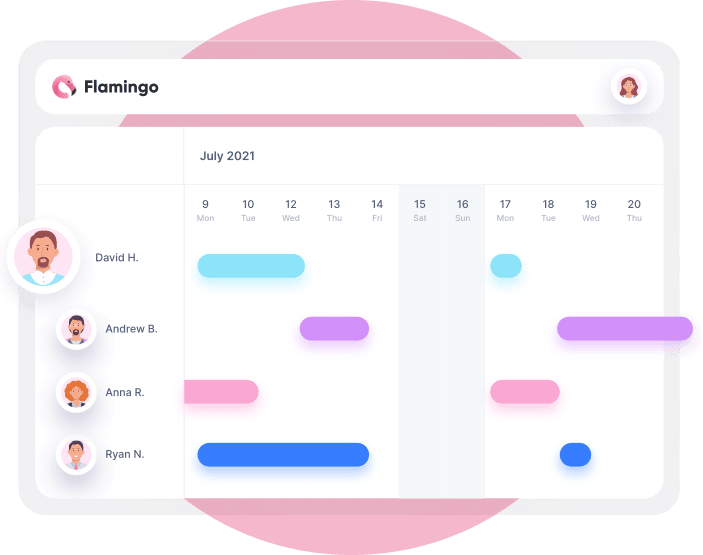
Flamingo is a leave management solution built for modern teams.
No more cluttered spreadsheets and manual data entry. Manage your entire team's leave, directly from Slack, and speed up your leave management workflow.
Learn moreThis post will guide you through employee leave laws for businesses and workers located in the state of Vermont.
Follow this guide to understand employers’ obligations for vacation time, paid time off (PTO), sick leave, parental leave, bereavement and more, along with state holidays observed in Vermont.
This page is intended for reference purposes only and does not constitute legal advice. Please see official government sources or consult a legal professional for actual legal advice.
Vermont employers do not have to provide paid or unpaid vacation time.
Use It or Lose It is not specifically addressed in Vermont law, so employers are free to enforce such a policy if they wish.
Use It or Lose It leave policies mean that any leave not used at the end of the year is forfeited, and not carried over to the following year. Learn more about Use It or Lose It policies here.
Unused PTO is not required to be paid out upon separation of employment (such as when an employee quits or is fired).
Read More: PTO Payout Laws by State
Vermont employers are required to provide one hour of paid sick leave for every 52 hours worked, up to a total of 40 hours per year.
Employees must be allowed to carry over up to 40 hours of unused sick leave from one year to the next, unless:
Besides any state laws or provisions written into employment contracts, employers in Vermont must comply with the Family and Medical Leave Act (FMLA), which entitles eligible employees the right to take 12 weeks of unpaid, job-protected leave for serious health conditions, or to care for spouses, children or parents with a serious health condition.
The following official state holidays are observed in Vermont:
| Date | Holiday |
|---|---|
| January 1 | New Year’s Day |
| 3rd Monday in January | Martin Luther King, Jr. Day |
| 3rd Monday in February | Presidents’ Day |
| First Tuesday in March (may vary by town) | Town Meeting Day |
| Last Monday in May | Memorial Day |
| July 4 | Independence Day |
| August 16 | Bennington Battle Day |
| 1st Monday in September | Labor Day |
| November 11 | Veterans Day |
| 4th Thursday in November | Thanksgiving Day |
| December 25 | Christmas Day |
With the exception of Town Meeting Day, employers do not have to provide a paid or unpaid day off for state holidays.
Employees are entitled to take time off to attend their town’s meeting, as long as they give at least seven days’ notice.
Employees required to work on state holidays are not legally entitled to extra compensation (such as higher pay or a compensatory day off), unless promised in their employment contract.
Employers with 10 or more workers must provide parental leave for employees who work an average of 30 or more hours over the course of a year.
Parental leave entitles the employee to up to 12 weeks of unpaid leave in a 12 month period for the birth of their child or the placement of a child under the age of 16 for the purpose of adoption.
Fathers have the same right to parental leave as mothers do, granting eligible employees 12 weeks of unpaid leave for their new birth or adoption.
Employees in Vermont are also entitled to up to four hours of unpaid leave in a 30 day period (max 24 hours over any 12 month period) to participate in preschool or school activities for the worker’s child, stepchild, foster child or ward, or to attend medical/dental appointments or respond to a medical emergency.
There is no legal requirement to provide bereavement leave in Vermont.
Employers to not have to pay for jury duty leave, but may not terminate, penalize or threaten employees for serving jury duty.
Employers are not required to provide voting leave in Vermont.
Members of the US armed forces or Vermont National Guard are entitled to unpaid leave for training, military drills, or other temporary duties under military authority, along with reinstatement rights when they return from leave.
Federal Law (the Uniformed Services Employment and Reemployment Rights Act (USERRA)) applies in Vermont, which states that military service members receive up to five years of unpaid leave for military service, and upon returning, must be reinstated to the same position (or an equivalent position) as they had before their leave.
Anything not covered in Vermont state leave laws is up to the discretion of the employer, such as whether or not to provide paid sick leave or PTO, or whether PTO rolls over from year to year.
However, if any benefits are laid out in an employee’s contract or company policy, employers must comply with what has been agreed in that document.
For example, if an employee’s contract states that they are to receive 12 days of PTO each year, the employer is legally required to provide this, even though paid time off is not required by state law.
https://labor.vermont.gov/sites/labor/files/doc_library/Earned%20Sick%20Time%20FAQ%20modified.pdf

No more cluttered spreadsheets and manual data entry. Manage your entire team's leave, directly from Slack, and speed up your leave management workflow.
Learn more